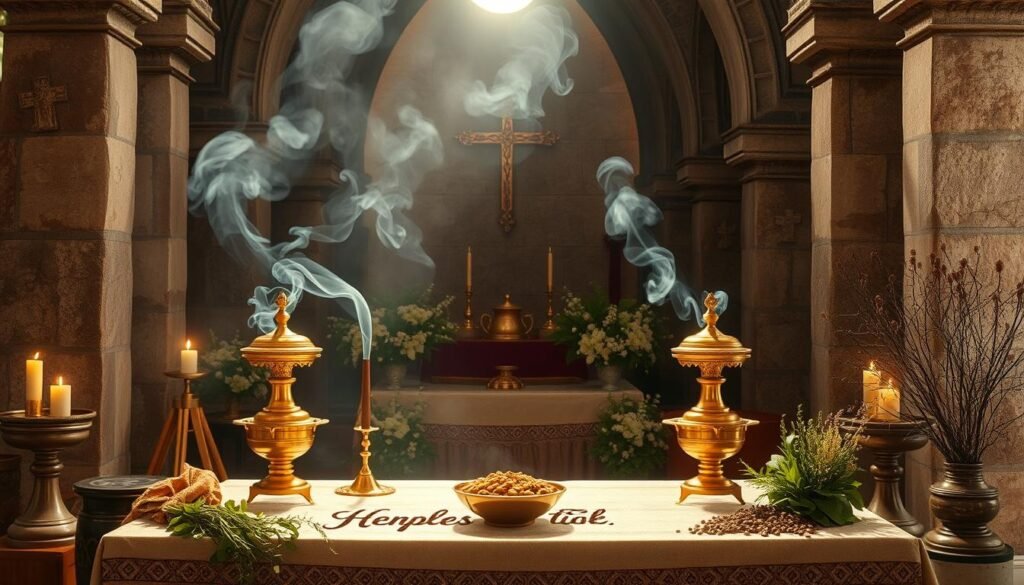Many wonder if burning sage is a spiritual ritual or something that goes against Christian beliefs. Can Christians Burn Sage? This question is especially interesting as it explores the mix of old spiritual practices and modern Christian views. Some Christians see smudging as a way to bring positivity and mindfulness. Yet, others believe it might clash with what the Bible teaches.
We will look into whether burning sage fits into the Christian faith. We’ll examine the history, personal beliefs, and the debate around this practice.
The Historical Context of Burning Sage
The practice of burning sage, known as smudging, has deep roots in many cultures. It’s especially important in Native American traditions. There, it was used in ceremonies to purify and cleanse spiritually. Sage was seen as a powerful herb, believed to protect and heal from negative energies.
Over time, sage’s importance grew beyond its original use. It became part of many spiritual traditions around the world. This change shows how sage’s role has evolved, reflecting its diverse uses today.
Exploring sage’s traditional use helps us understand its modern meanings. It makes us think about how it fits into today’s religious practices. Especially in Christianity, where its acceptance is still debated.
Understanding the Practice of Smudging
Smudging is a spiritual practice that uses herbs, like sage, to clean spaces and people. It’s a way to get rid of bad energy and make a place peaceful. Many cultures do this, but they see it differently.
When smudging, a sage bundle is burned slowly. The smoke fills the area or person being cleansed. It’s popular today for its health benefits and nice smell. Some people do it without any spiritual beliefs, while others worry about its spiritual meaning.

Smudging is more than just burning herbs. It’s about the reasons people do it. Some do it for health or to connect with their heritage. Smudging shows how old traditions meet new beliefs.
Can Christians Burn Sage?
The question of whether Christians can burn sage is common. Sage isn’t mentioned in the Bible, but burning incense is. God told Moses how to use incense in worship, showing its importance. This history shapes the debate about Christians and sage.
Biblical Perspectives on Burning Sage
The Bible doesn’t talk about sage, but it does mention incense. This tradition is tied to worship and prayer. It makes some Christians think about sage burning in a similar way.
Personal Conviction Among Christians
People have different opinions on burning sage. Some see it as a way to spiritually cleanse, fitting their beliefs. Others avoid it because of its ties to pagan rituals and the occult. Ultimately, personal beliefs guide how Christians view sage burning.
The Spiritual Significance of Sage in Various Cultures
Sage has a deep meaning in many cultures. Its cultural significance of sage is especially strong in native traditions. Here, it’s seen as key for spiritual cleansing.
In Native American rituals, sage is used to remove bad energies. It helps bring emotional peace.
Many groups use sage in their spiritual ways. Each gives it a special meaning. Some see it as healing, others for blessings or to make a sacred space.
This shows how sage is important in many spiritual practices around the world.
Its use in different cultures can spark interesting discussions. Some are cautious because of its ties to native traditions. Yet, others look at its long history of use for spiritual cleansing.
Learning about sage’s role in cultures can deepen our respect for its heritage.
Christian Views on Witchcraft and Occult Practices
Christian beliefs often clash with witchcraft and occult practices. Many Christians see these as against biblical teachings. They believe in following scripture closely, which warns against certain practices seen as against God’s will.
Burning sage, used in smudging rituals, is often viewed with doubt. This is because it’s linked to traditions not based on Christianity. Critics within the faith say the intent behind these practices is key. They believe using witchcraft-related practices can lead to blending beliefs, which might weaken Christian faith.
The Bible teaches the importance of pure worship and evaluating spiritual impacts. This includes the use of sage and items linked to occult rituals. On the other hand, some cultures see burning sage as a way to cleanse and enhance spirituality.
This difference sparks important questions among believers. It makes them think about whether adopting such rituals is right. The debate on witchcraft and occult practices in Christianity is crucial for understanding faith and spirituality.
The Role of Incense in Biblical Traditions
In biblical traditions, incense was key in worship and offerings. It was deeply rooted in Old Testament rituals, showing respect and purity. This practice helped believers connect with God and symbolized prayers going up to Him.
God’s Command to Moses Regarding Incense
God told Moses how to make and burn incense, with specific blends for offerings. This shows the importance of following God’s commands in worship. The incense was more than just a scent; it was a symbol of people’s prayers and devotion.
Unlike today, where burning sage is informal, the Bible had strict rules for incense. Its use in the Old Testament was meaningful and spiritual. Knowing these differences helps us understand modern practices and their roots.

Modern Interpretations of Sage Burning
In recent years, burning sage has changed a lot. Now, people enjoy its smell and think it might be good for their health. This has made sage popular for creating a peaceful space, without the old spiritual meanings.
Sage burning is also used in New Age practices. It’s seen as a way to clean spaces or personal energy. This has made some Christians question if it fits with their beliefs. It’s important to understand how society views sage burning and its role in today’s spirituality.
Potential Health Benefits of Burning Sage
Sage is known for its cultural and spiritual value. But recent studies show it also has health benefits. Burning sage releases compounds with medicinal properties.
These compounds may boost mood and reduce stress. This makes sage a favorite for those seeking spiritual and wellness gains.
Medicinal Uses of Sage
Studies suggest that burning sage has antimicrobial effects. This could clean the air and improve health. Sage may also enhance memory and mental focus.
Using sage regularly could benefit mental and respiratory health. It offers a non-traditional wellness option. More information can be found in Christian perspectives on alternative healing.
While sage’s health benefits are notable, they should not replace faith-based healing. Sage can be a tool for purification and a health ally.
FAQ
Can Christians burn sage?
Whether Christians can burn sage depends on their beliefs and church. Some see it as a way to cleanse spiritually. Others think it goes against Christian teachings because of its ancient roots and links to pagan rituals.
What is the historical context of burning sage?
Sage burning comes from many cultures, especially Native American tribes. They used it in purification rituals and ceremonies. This history makes its place in Christianity complex.
How is smudging defined in spiritual practices?
Smudging uses herbs like sage to purify. It’s done for spiritual and health reasons. Its meaning varies across cultures and personal views.
What are biblical perspectives on burning sage?
The Bible doesn’t mention sage, but it talks about burning incense. God told Moses to use it. Christians debate if burning sage is right based on these verses and their beliefs.
How does personal conviction affect views on burning sage among Christians?
Personal beliefs greatly influence if Christians burn sage. Some see it as a cultural act, while others worry about its spiritual and historical ties.
What is the spiritual significance of sage in various cultures?
Sage means different things in different cultures. It’s often linked to purification and fighting negative vibes. In Native American traditions, it’s sacred. Other cultures use it for blessings or to create sacred spaces.
How do Christians view witchcraft and occult practices regarding sage burning?
Many Christians don’t support witchcraft or occult practices. They see them as against biblical teachings. This makes burning sage a tricky issue for some believers.
What role does incense play in biblical traditions?
In the Bible, incense is very important. It represents prayers of the faithful. God gave specific recipes for sacred offerings. This contrasts with how sage is used today.
How are modern interpretations of sage burning different from traditional uses?
Today, people burn sage for its smell and health benefits. This shift makes Christians question its place in their faith.
What are the potential health benefits of burning sage?
Sage burning might help with health, like fighting germs and improving mood. But, these benefits shouldn’t replace faith practices or traditional healing in Christian communities.

Rockin’ the faith, one verse at a time!
Growing up, the Bible’s stories deeply impacted me. Now, with over 15 years of preaching experience, I blend timeless teachings with modern technology, making them relevant for today’s world.
Bible Hub Verse is my platform to share historical insights and thought-provoking articles, exploring both familiar and uncommon Christian topics. My passion is building a welcoming online space for everyone to learn, grow in their faith, and discover the Bible’s enduring message.
Join the journey!
God bless you.









